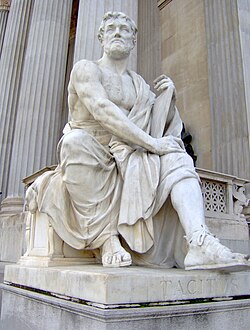Tacitus Quote
Related Quotes
Let my silence grow with noise as pregnant mothers grow with life. Let my silence permeate these walls as sunlight permeates a home. Let the silence rise from unwatered graves and craters left by bomb...
Kamand Kojouri
Tags:
abuse, abused, activism, activism poems, activist, amnesty, bellies, bombs, broken hearts, coming together
I believe the best service to the child is the service closest to the child, and children who are victims of neglect, abuse, or abandonment must not also be victims of bureaucracy. They deserve our de...
Kenny Guinn
Tags:
best, abandonment, abuse, bureaucracy, child abuse, childcare, childhood, foster care, life, neglect
About Tacitus
Publius Cornelius Tacitus, known simply as Tacitus ( TAS-it-əs, Latin: [ˈtakɪtʊs]; c. AD 56 – c. 120), was a Roman historian and politician. Tacitus is widely regarded as one of the greatest Roman historians by modern scholars.
Tacitus’ two major historical works, Annals (Latin: Annales) and the Histories (Latin: Historiae), originally formed a continuous narrative of the Roman Empire from the death of Augustus (14 AD) to the end of Domitian’s reign (96 AD). The surviving portions of the Annals focus on the reigns of Tiberius, Claudius, Nero, and those who reigned in the Year of the Four Emperors (69 AD).
Tacitus's other writings discuss oratory (in dialogue format, see Dialogus de oratoribus), Germania (in De origine et situ Germanorum), and the life of his father-in-law, Agricola (the general responsible for much of the Roman conquest of Britain), mainly focusing on his campaign in Britannia (De vita et moribus Iulii Agricolae). Tacitus's Histories offers insights into Roman attitudes towards Jews, descriptions of Jewish customs, and context for the First Jewish–Roman War. His Annals are of interest for providing an early account of the persecution of Christians and one of the earliest extra-Biblical references to the crucifixion of Jesus.
Tacitus’ two major historical works, Annals (Latin: Annales) and the Histories (Latin: Historiae), originally formed a continuous narrative of the Roman Empire from the death of Augustus (14 AD) to the end of Domitian’s reign (96 AD). The surviving portions of the Annals focus on the reigns of Tiberius, Claudius, Nero, and those who reigned in the Year of the Four Emperors (69 AD).
Tacitus's other writings discuss oratory (in dialogue format, see Dialogus de oratoribus), Germania (in De origine et situ Germanorum), and the life of his father-in-law, Agricola (the general responsible for much of the Roman conquest of Britain), mainly focusing on his campaign in Britannia (De vita et moribus Iulii Agricolae). Tacitus's Histories offers insights into Roman attitudes towards Jews, descriptions of Jewish customs, and context for the First Jewish–Roman War. His Annals are of interest for providing an early account of the persecution of Christians and one of the earliest extra-Biblical references to the crucifixion of Jesus.
